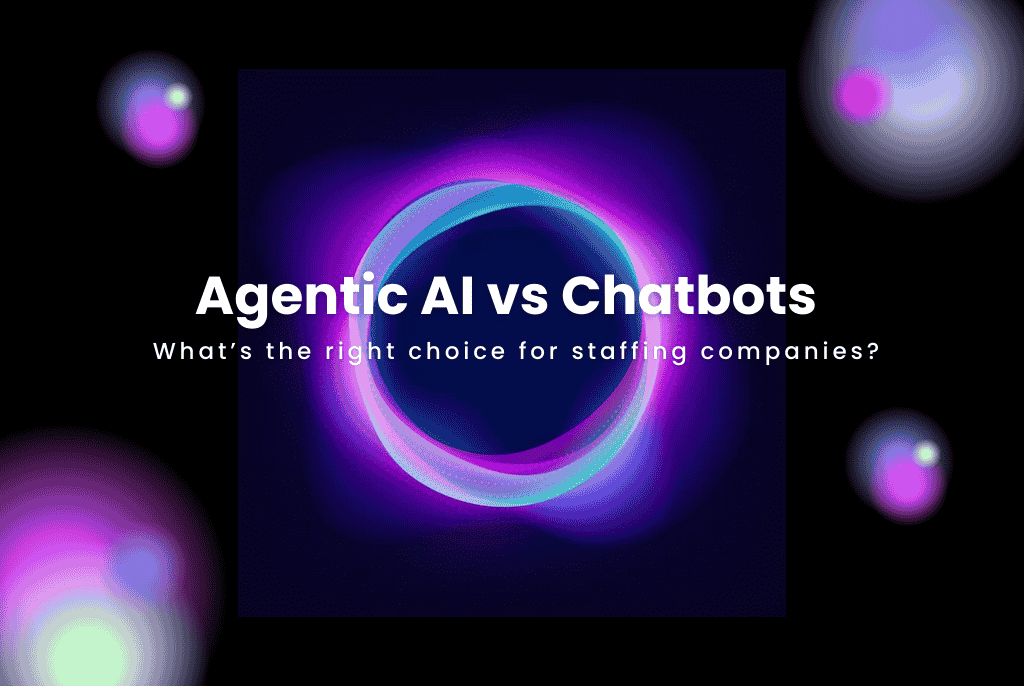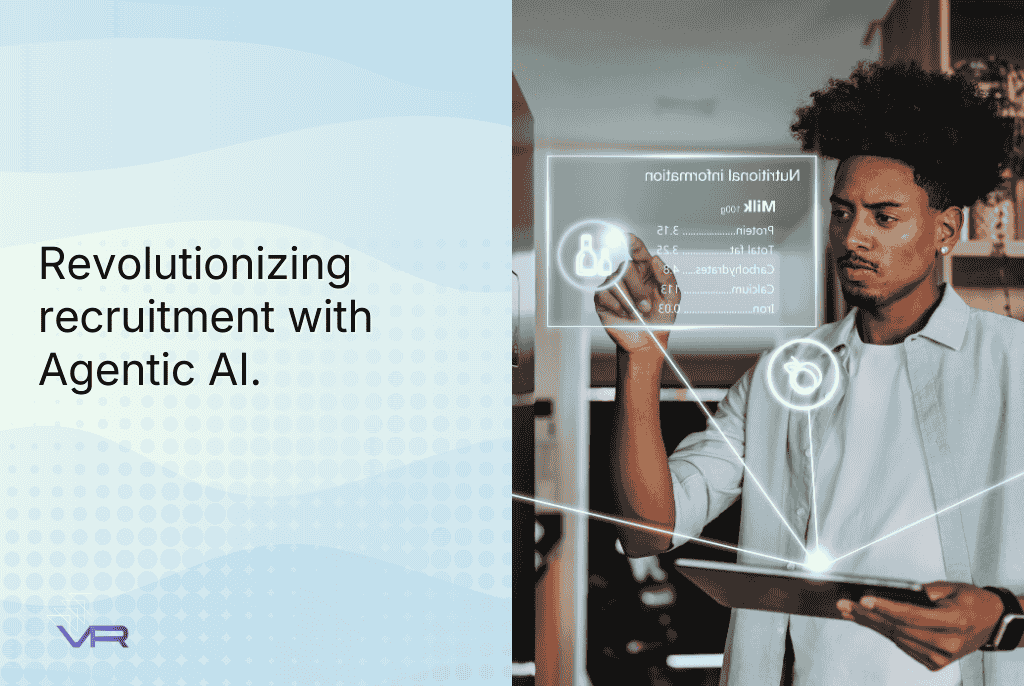In today’s high-volume staffing environment, automation is everywhere – but the term “AI” is often used too broadly. A simple rule-based chatbot is a…………
How to win candidate trust in AI hiring


In this article:
- Candidate skepticism in recruitment
- How do AI agents improve trust?
- Overcoming candidate resistance
- FAQs
Key takeaways
- Candidate skepticism is common, as many fear bias, depersonalization, or being overlooked when AI is used in hiring.
- Trust grows when recruiters communicate clearly, show transparency about AI’s role, and maintain visible human oversight.
- AI enhances candidate experiences by delivering speed, consistency, and personalization that reduce ghosting and improve engagement.
- Overcoming resistance requires empathy through educating candidates, providing feedback, and blending human-AI collaboration.
- A trust-first approach to AI builds long-term brand value by driving loyalty, referrals, and a stronger competitive edge.
As a recruiter, you know the frustration of candidates ghosting midway through the process or hesitating to engage because they sense something impersonal about your approach.
In today’s competitive talent market, where AI in staffing is becoming the norm, this skepticism can slow down your time-to-fill and hurt your placement rates. But by prioritizing AI candidate trust, you can leverage automation as a strength that enhances relationships rather than eroding them.
This article examines strategies for building trust through candidate engagement AI and delivering a personalized candidate experience. Discover how to achieve faster and more efficient hiring while maintaining a human touch. You’ll also learn practical ways to integrate recruitment AI tools that not only speed up processes but also build lasting candidate loyalty.
Candidate skepticism in recruitment
You know the drill: candidates apply, but many hesitate when they learn AI is involved in screening or interviews. Recent surveys highlight this issue. For instance, 66% of U.S. adults express reluctance to apply for jobs where AI plays a role in hiring decisions.
Another study reveals that two-thirds of job seekers are uncomfortable with AI reviewing resumes and making initial hiring decisions. This skepticism stems from fears of bias, lack of personalization, and the perceived coldness of automation.
Why does this happen? Many candidates worry that AI overlooks their unique skills or perpetuates inequalities. A 2023 report noted that 49% of employed job seekers believe AI tools are more biased than humans.
In staffing, where roles often require nuanced matches, this distrust can lead to lower application rates and higher drop-offs. As a recruiter, you’ve likely seen candidates abandon processes mid-way, citing concerns over “robotic” interactions.
To address this, start by openly acknowledging fears surrounding AI. Communicate how your AI systems are designed with human oversight to ensure fairness. For example, ConverzAI’s virtual recruiter handles initial outreach via omnichannel engagement, but continually loops in human recruiters for nuanced decisions. This approach not only mitigates skepticism but also aligns with broader trends in staffing automation.
Why trust matters
Building AI candidate trust is essential for your staffing success. When candidates trust your process, they’re more likely to complete applications, respond to outreach, and accept offers. Trusted processes also lead to better candidate experiences, fostering word-of-mouth referrals that expand your talent pool.
In a competitive market, where staffing agencies vie for the same skilled workers, trust gives you an edge. It also protects your brand from negative experiences shared on platforms like Glassdoor, which can deter future candidates. Forbes notes that organizations with high trust levels see 2.5 times more revenue growth, a principle that applies to staffing firms too.
For HR professionals and recruiters like you, prioritizing trust means focusing on empathy alongside efficiency. Solutions like ConverzAI’s candidate engagement AI help by providing predictive insights that match candidates to roles accurately, reducing mismatches that erode confidence. Ultimately, trust translates to loyalty—candidates who feel valued are more likely to become repeat placements or even refer others, strengthening your long-term pipeline.
| Task | Best Handled By | Why? |
|---|---|---|
| Sourcing candidates | AI | Scans thousands of profiles in seconds |
| Screening interviews | AI | Asks candidates standardized questions, analyzes responses, and shortlists top matches |
| Initial candidate outreach | AI | Automates emails, texts, and calls with personalized messaging |
| Submission decisions | Human | Requires emotional intelligence and nuanced judgment |
| Negotiating offers | Human | Involves persuasion, empathy, and client relationship management |
| Building long-term trust | Human | Relies on rapport and understanding unique client/candidate needs |
How do AI agents improve trust?
Candidates decide whether to trust your process within the first few interactions. That trust grows when communication feels clear, fair, and human—even when it’s powered by AI.
Be transparent
Candidates appreciate clarity. Let them know upfront that they’ll be engaging with a virtual recruiter. A simple line in your job ad, email, or text, like “You’ll first hear from our virtual recruiter, who helps us move faster and stay organized,” can go a long way. When the AI introduces itself honestly, it sets the tone for fairness and professionalism.
Show empathy
Speed matters, but empathy matters more. Candidates want to feel understood, not rushed. Design your AI interactions to acknowledge their time, concerns, and pauses. If someone needs clarification, the system should allow it—no robotic pushing forward. And when the topic gets personal (like career goals or salary expectations), hand off the conversation to a human recruiter who can respond thoughtfully.
Explain AI’s role
Candidates trust your process when they understand it. Explain that AI helps collect details quickly and match skills efficiently—but people make those final hiring decisions. For instance: “Our virtual recruiter helps us learn about you faster, so our team can focus on finding your best-fit role.” This helps candidates see AI as an assistant, not a replacement.
Make them feel heard
Even in automated chats, people want to feel that their input counts. AI tools should acknowledge responses, adapt based on what’s shared, and ensure follow-ups reflect earlier conversations. A short email or recruiter message referencing a candidate’s earlier input reinforces that you were listening—and builds real trust.
Promote bias-free hiring
Trust also grows when candidates believe they’re being judged fairly. Because AI agents can be trained and audited to remove human bias, they help create a level playing field. Communicating that your process is reviewed for fairness reassures candidates that their skills—not their background—drive the outcome.
Personalization at scale
With staffing automation, AI analyzes candidate data, preferences, skills, and past interactions to craft custom messages and recommendations. For busy recruiters handling multiple requisitions, this means sending targeted emails or SMS that reference a candidate’s specific experience, making them feel seen.
ConverzAI excels here with its omnichannel engagement, using predictive insights to suggest roles that align perfectly, improving the personalized candidate experience.
Imagine scaling this for enterprise clients: AI handles thousands of applicants, grouping them by fit and customizing follow-ups.
To implement:
- Use AI to segment candidates by industry or skill level.
- Personalize job alerts via candidate engagement AI.
- Track responses to refine future interactions.
This approach not only builds AI candidate trust but also positions your agency as innovative, driving better placement outcomes.
As Amanda Marciniak, Director of Learning and Development, SSi People explains, “Being contacted by the Virtual Recruiter ensures candidates realize their resume did not go to a black hole and that they are truly being screened for the position. And even if it’s not a perfect fit, we have all this updated information now on file, and we can reach out when we have something that is a good fit for them.”
Overcoming candidate resistance
Candidate resistance to AI in hiring often arises from fears of bias or lack of empathy, but you can overcome it with strategic communication and hybrid approaches. Start by educating candidates. Explain how your recruitment AI tools reduce bias through data-driven matching. Do this through studies showing how AI can promote fairness when properly designed.
Highlight benefits like faster feedback and personalized experiences to shift perceptions.
Practical steps include:
- Transparent messaging: In job postings, note AI’s role and human involvement.
- Feedback loops: Provide reasons for decisions to build trust.
- Training your team: Equip recruiters to handle AI-related questions empathetically.
Emphasizing human-AI collaboration is the key to reducing skepticism. By integrating candidate engagement AI thoughtfully, you can turn resistance into acceptance and improve your overall staffing operations.
Long-term brand benefits
Using AI in staffing yields long-term brand benefits that extend beyond immediate hires. A trusted process strengthens your reputation, attracting top talent and clients who value innovation. Organizations that utilize AI for personalized candidate experiences report improved employer branding.
For staffing agencies, this means repeat business and referrals. ConverzAI’s virtual recruiter, with its focus on consistent, transparent interactions, helps build a brand known for efficiency and care. Over time, this encourages loyalty—candidates become advocates, sharing positive experiences online.
Benefits include:
- Scalability: Handle high-volume hiring without quality dips.
- Cost savings: Reduce time-to-fill, lowering overheads.
- Competitive edge: Stand out with advanced staffing AI automation.
AI-integrated brands enjoy sustained growth through better talent acquisition. By prioritizing AI candidate trust, you secure a stronger market position.
Staying ahead with AI staffing tools
As you move through the evolving staffing landscape, embracing AI with a trust-first mindset positions you for success. By focusing on speed, personalization, and transparency, you can create experiences that resonate with candidates and deliver results for clients.
You need a solution that automates tasks while keeping interactions human-like. Ready to improve your processes? Book a demo with ConverzAI today.
FAQs
How comfortable are job seekers with AI in the hiring process?
Job seekers’ comfort with AI varies, but many remain uncomfortable with AI making final decisions. Building AI candidate trust through transparency helps.
Can AI reduce bias and improve fairness during candidate screening?
Yes, AI can reduce bias by focusing on skills over demographics. However, it requires careful design to avoid perpetuating issues.
Do candidates trust AI to evaluate interviews and match talent to roles accurately?
Trust is growing, with 64% trusting AI for matching, but dips for evaluations due to bias concerns. Candidate engagement AI improves accuracy when combined with human oversight.
What concerns do candidates have about the lack of human interaction in AI-driven hiring?
Primary concerns of candidates include depersonalization and missed nuances, with many fearing a "human factor" loss. A personalized candidate experience via hybrid models addresses this issue.
How can recruiters build empathy and trust when using AI tools?
Recruiters must focus on transparent communication and human touchpoints. They should use AI to enhance, not replace, empathy.
What role should human recruiters still play alongside AI?
Human recruiters handle strategy, relationships, and final decisions, while AI manages screening and data. This collaboration ensures a trusted, efficient process.

Related Blogs
For staffing firms, every decision circles back to one question: Does it move the needle on results? Whether it’s lowering cost-to-hire or…….
As a recruiter juggling endless job requisitions, candidate screenings, and client demands, you know that the pressure to fill roles quickly is relentless. And now, with AI on the scene, concerns have arisen about job security.
You’re juggling endless job requisitions, chasing candidates who never respond, and struggling to keep clients happy. It’s a familiar grind for staffing agencies and recruiters. But what if…..
In today’s high-volume staffing environment, automation is everywhere – but the term “AI” is often used too broadly. A simple rule-based chatbot is a…………
For staffing firms, every decision circles back to one question: Does it move the needle on results? Whether it’s lowering cost-to-hire or…….
As a recruiter juggling endless job requisitions, candidate screenings, and client demands, you know that the pressure to fill roles quickly is relentless. And now, with AI on the scene, concerns have arisen about job security.
You’re juggling endless job requisitions, chasing candidates who never respond, and struggling to keep clients happy. It’s a familiar grind for staffing agencies and recruiters. But what if…..


